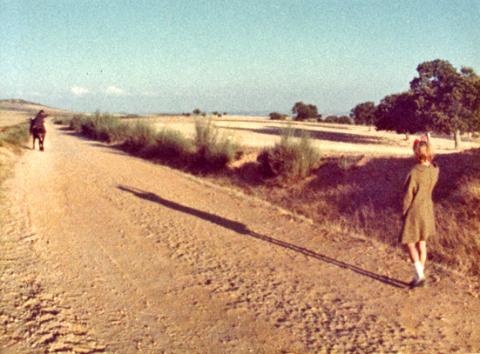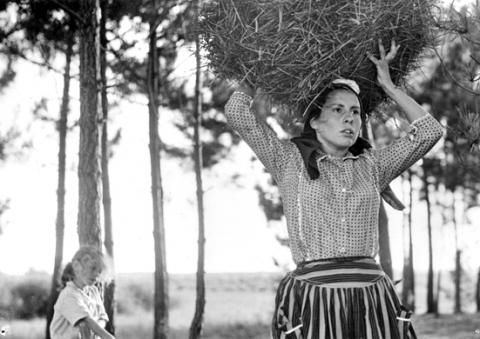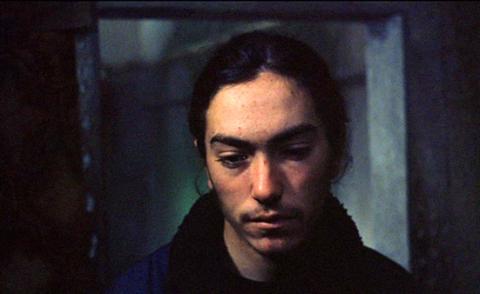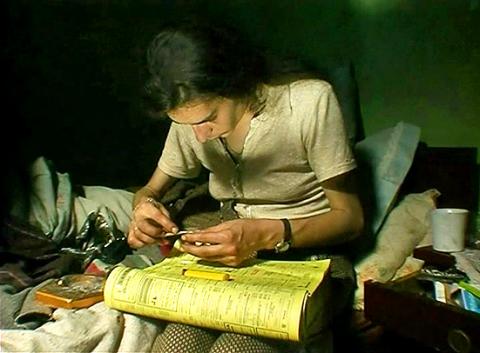Portugal is known for inaugurating the European Age of Discovery and, more recently, Europe’s recession and debt crisis. The country’s cinema, however, has remained largely unknown.
Movie lovers can get a taste of the Portuguese movie scene at this year’s Taipei Film Festival (台北電影節), which highlights the country’s cinematic achievements with an ambitious lineup of 55 feature and short films spanning the silent era to the digital age.
Kuo Ming-jung (郭敏容), the festival’s program director, thought that she would be dazzled by a plethora of choices, judging by the popularity of the country’s productions on the international film festival circuit.

Photo courtesy of Taipei Film Festival
STAGNANT INDUSTRY
Surprisingly, Kuo says, the reality is quite the opposite, as the economic crisis has taken a toll on the Portuguese film industry, with the number of local productions falling precipitously since 2011.
“[Portugal] must have very rich cinematic traditions to continue to create such brilliant cinematic works under these difficult circumstances,” Kuo says.

Photo courtesy of Taipei Film Festival
She’s right.
The tradition begins with Manoel de Oliveira (1908-2015), whose 88-year career spans most of Portuguese film history. The festival will include four of his works, including Labor on the Douro River (1931), a documentary about the life of poor dockworkers on the Douro River. Oliveira’s Italian neo-realist-influenced Aniki-Bobo (1942) follows the adventures of a gang of street kids growing up in the slums of Porto, the country’s second-largest city. It includes natural performances from non-professional actors and location shooting.
‘SCHOOL OF REIS’

Photo courtesy of Taipei Film Festival
For today’s Portuguese filmmakers, the most influential figure is undoubtedly Antonio Reis (1927-1991). A poet before entering filmmaking as the assistant director for Oliveira’s ethnographic Rite of Spring (1963), Reis is known for an extraordinary body of work, much of which was co-directed with his psychologist wife, Margarida Cordeiro.
Their collaborations have often been described as lyrical explorations of Portugal’s people, blurring the line between fiction and documentary, past and present and veering into a more literary sphere filled with myth and folklore.
Commonly regarded as the finest of the duo’s unique cinematic style and sensibility, Tras-os-Montes (1976), for example, is a magical evocation of the land and inhabitants in Portugal’s remote northern province of Tras-os-Montes.

Photo courtesy of Taipei Film Festival
Reis’ importance also lies in his career as a long-time professor at Lisbon Theatre and Film School from 1977 to 1991, where he influenced and inspired a new generation of filmmakers — who have been collectively dubbed the School of Reis.
Part of the festival’s program is dedicated to the this group. Among them, Joao Cesar Monteiro’s award-winning Recollections of the Yellow House (1989) pays tribute to Reis’ cinema through a morbid comedy following the misadventures of a grizzled, wretched bachelor played by the director. Our Beloved Month of August (2008) by Miguel Gomes recalls the poetic form of Site of Spring, blending drama, documentary interviews and music to tell a story of a film crew shooting a movie in Portugal’s rural heartland.
The festival also pays tribute to the Cinema Novo (New Cinema) movement in the 60s, which is aesthetically similar to to French New Wave. Paulo Rocha, a key figure of the movement, made Change of Life (1966), which tells the melancholy tale of a man who returns home to his fishing village after fighting a war in Angola. Written by Reis, who met Rocha through Oliveira, the film tackles, albeit indirectly, the war fought between Portugal and its African colonies striving for independence, a taboo subject under the Salazar regime.

Photo courtesy of Taipei Film Festival
TIGHT COMMUNITY
Kuo says Portugal’s film industry is more like a “small, close-knit community” than a business.
“Almost no filmmaker works outside this network,” she says.

Photo courtesy of Taipei Film Festival
As a result, Portugal’s radical cinema continues to thrive.
Having studied under Reis, Pedro Costa has come to be recognized as one of the world’s most important filmmakers. The festival will show seven Costa films, following the director’s cinematic evolution from a relatively conventional filmmaker with Blood (1989), to his dauntingly austere and provocative trilogy, Bones (1997), In Vanda’s Room (2000) and Colossal Youth (2006).
The trilogy examines the lives of poor immigrants who live in slums outside Lisbon. Costa frames his scenes with long shots, which lends the films a a sense of immediacy, while creating the texture of a painting.

Photo courtesy of Taipei Film Festival
Joao Pedro Rodrigues and Joao Rui Guerra da Mata, both students of Reis, are celebrated for their polymorphous works that range from dramas that explore desire and sexuality — O Fantasma (2000), Two Drifters (2005) and To Die Like a Man (2009) — and films inspired by Da Mata’s childhood memories of Macao, including The Last Time I Saw Macao (2012).
Costa, Rodrigues and Da Mata will attend the festival to talk about their films through a series of forums and question-and-answer sessions. For more information, visit the event’s Web site at www.taipeiff.org.tw

Photo courtesy of Taipei Film Festival

Photo courtesy of Taipei Film Festival

In the March 9 edition of the Taipei Times a piece by Ninon Godefroy ran with the headine “The quiet, gentle rhythm of Taiwan.” It started with the line “Taiwan is a small, humble place. There is no Eiffel Tower, no pyramids — no singular attraction that draws the world’s attention.” I laughed out loud at that. This was out of no disrespect for the author or the piece, which made some interesting analogies and good points about how both Din Tai Fung’s and Taiwan Semiconductor Manufacturing Co’s (TSMC, 台積電) meticulous attention to detail and quality are not quite up to

April 21 to April 27 Hsieh Er’s (謝娥) political fortunes were rising fast after she got out of jail and joined the Chinese Nationalist Party (KMT) in December 1945. Not only did she hold key positions in various committees, she was elected the only woman on the Taipei City Council and headed to Nanjing in 1946 as the sole Taiwanese female representative to the National Constituent Assembly. With the support of first lady Soong May-ling (宋美齡), she started the Taipei Women’s Association and Taiwan Provincial Women’s Association, where she

Chinese Nationalist Party (KMT) Chairman Eric Chu (朱立倫) hatched a bold plan to charge forward and seize the initiative when he held a protest in front of the Taipei City Prosecutors’ Office. Though risky, because illegal, its success would help tackle at least six problems facing both himself and the KMT. What he did not see coming was Taipei Mayor Chiang Wan-an (將萬安) tripping him up out of the gate. In spite of Chu being the most consequential and successful KMT chairman since the early 2010s — arguably saving the party from financial ruin and restoring its electoral viability —

It is one of the more remarkable facts of Taiwan history that it was never occupied or claimed by any of the numerous kingdoms of southern China — Han or otherwise — that lay just across the water from it. None of their brilliant ministers ever discovered that Taiwan was a “core interest” of the state whose annexation was “inevitable.” As Paul Kua notes in an excellent monograph laying out how the Portuguese gave Taiwan the name “Formosa,” the first Europeans to express an interest in occupying Taiwan were the Spanish. Tonio Andrade in his seminal work, How Taiwan Became Chinese,